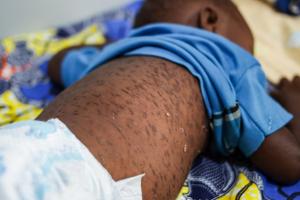Measles outbreak threatens public health in Cuanza Sul
The Sumbe Pediatric Hospital is under pressure due to the significant increase in measles cases in recent weeks. Currently, 23 children remain hospitalized with a diagnosis of the disease and, according to the hospital's management, there has been an average of eight new admissions a day. At times, such as last week, the unit has received up to 40 cases at the same time, with days when 15 children were admitted with symptoms compatible with measles.
Isilda Ngunza Manuel, a vendor in Matabicho square and resident of Bairro da Pedra, is one of the mothers affected. Her four-month-old daughter began to show persistent fevers and red spots all over her body. "I was very scared. At first, I thought it was just heat or allergies. But then it got worse, and I had to go to hospital straight away..." she says. Like the case of Isilda's daughter, many others have come to the unit with warning signs. According to the Director of the Provincial Children's Hospital, Dr. Andreza das Dores Bastos Diogo, the impact of the disease on families' lives and on the hospital's capacity has been evident. “What needs to be done first is to thoroughly investigate the cases, understand how they are emerging and vaccinate the affected communities immediately.”
According to the health authorities who are closely monitoring the situation, so far 264 suspected measles cases have been reported, spread across 16 of the province's 24 municipalities. Of the total number of suspected cases reported and investigated, 34 are positive (of which 2 with double infection “Measles and Rubeola”), 29 negatives, 65 pending, 148 confirmed by epidemiological link and 9 deaths.
The cases range from 4 months to 35 years. The most affected age group is children from 1 to under 5 years old, including unvaccinated babies, schoolchildren and young adults.
According to vaccination status, 224 of the 264 children affected by measles have not been vaccinated. Of the 40 vaccinated, 29 received the first dose and 11 completed the second dose.
To contain the spread, epidemiological surveillance teams have been conducting active house-to-house and health unit searches, taking samples for laboratory analysis and filling out notification / investigation forms. At the same time, a vaccine blockade action is underway, with the mobilization of health professionals, community technicians and local leaders, who have been sensitizing families and offering the vaccine directly in the communities where cases have been identified.
Measles is a highly contagious viral disease that can cause serious complications such as pneumonia, severe diarrhea, encephalitis and, in extreme cases, lead to death, especially among young children and unvaccinated people. Although preventable with a safe and effective vaccine, measles continues to pose a significant risk in contexts with low vaccination coverage.
For Dr. Manuel Muixi, a World Health Organization (WHO) expert deployed in the province, the response depends on swift and coordinated action. "Measles is a serious threat to children's health, as well as adults, but it can be contained with effective vaccination, active surveillance and strong community mobilization. We are working hand in hand with the local authorities to stop this chain of transmission," he says.
The Director of the Cuanza Sul Provincial Health Office, Dr. Nelson Camilo, stresses the importance of collaboration between all sectors. "We are mobilized to protect our communities. It is essential that parents take their children for vaccination and that everyone follows the guidelines of the health authorities."
With technical and logistical support from the WHO, the Ministry of Health and the Expanded Vaccination Program (EPP) are stepping up efforts to contain the outbreak and strengthen prevention throughout the province. The expectation is that, with block vaccination, the active search for cases and the direct involvement of communities, the number of new infections will begin to fall in the coming days.
